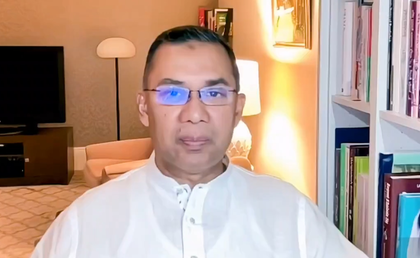BNP's Rahman gains ground in Bangladesh amid Western strategic shift: Report
By IANS | Updated: November 12, 2025 20:50 IST2025-11-12T20:48:09+5:302025-11-12T20:50:20+5:30
Dhaka, Nov 12 Since the political realignment in Bangladesh following the fall of the Awami League government led ...

BNP's Rahman gains ground in Bangladesh amid Western strategic shift: Report
Dhaka, Nov 12 Since the political realignment in Bangladesh following the fall of the Awami League government led by Sheikh Hasina in August 2024, Western powers have recalibrated their interests in the country with Tarique Rahman, the Acting Chairman of Khaleda Zia-led Bangladesh Nationalist Party (BNP), formerly seen as a "symbol of kleptocratic government and violent politics", now emerging as a "viable political partner and a possible future Prime Minister", a report said on Wednesday.
“The current political trajectory in Bangladesh has brought the spotlight back to the longstanding conundrum surrounding the international community’s role in fragile democracies. For the last two decades, Western nations and multilateral bodies have assumed the uninvited role of guardians of democratic accountability, the rule of law and anti-corruption efforts in Bangladesh. However, the same international institutions now appear to be accomplices — either by passive approval or changed diplomatic policies — in the reinstatement of political leaders they once condemned. The case of Tarique Rahman, the exiled Chairman of the Bangladesh Nationalist Party (BNP) is a case in point,” a report in the South Asia Centre of London School of Economics and Political Science detailed.
It stated that the changing narrative surrounding Rahman highlights a deeper contradiction in international action toward Bangladesh: a discrepancy between normative principles and political realism.
“In the past, the West justified their actions toward Bangladesh’s politics — whether, for instance, through aid conditionality, governance programs or diplomatic pressure — as a means of combating corruption and promoting democracy. Yet, these same actors now appear willing to reinterpret past narratives of corruption and extremism when doing so aligns with changing geopolitical or regional priorities,” the report stressed.
“This pattern is not new, nor is it unique toward Bangladesh. It reflects a broader logic of what might be called ‘instrumental internationalism’ — a paradigm that allows global powers to exploit moral rhetoric as a flexible tool for exerting control rather than advocating a principled stance. It also allows the West to shuffle between regimes to ensure its geopolitical interests are served, particularly in the face of changing international political landscapes,” it noted.
According to the report, over several decades, fraying democracies have applied uneven standards while condemning human rights violations and disregard for the rule of law; some regimes are criticised, while others are ignored or defended when aligned with Western interests.
Disclaimer: This post has been auto-published from an agency feed without any modifications to the text and has not been reviewed by an editor
Open in app